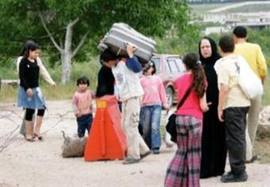 Spillover from the Syrian war has cost neighboring Lebanon billions of dollars, deeply damaged its economy and harshly strained social services such as health, education and electricity, according to a new report by the World Bank.
Spillover from the Syrian war has cost neighboring Lebanon billions of dollars, deeply damaged its economy and harshly strained social services such as health, education and electricity, according to a new report by the World Bank.
The assessment was prepared quickly for a meeting of donors and others at the U.N. General Assembly in New York next week to try to raise aid to relieve Lebanon’s heavy financial burden. U.N. Secretary-General Ban Ki-moon is leading the meeting.
The World Bank has not yet released the report, but it was published Thursday on the website of the Lebanese daily al-Safir.
“With the escalation of the Syrian conflict, spillovers onto Lebanon have rapidly moved beyond the humanitarian to the economic and social spheres,” the report said.
The civil war raging for more than two years has sent more than 900,000 Syrian refugees pouring into Lebanon, according to the report. That amounts to more than 20 percent of Lebanon’s pre-crisis population of about 4.3 million.
About 2,000 Syrian refugees are arriving every day. Based on current trends, 1.3 million Syrian refugees could be in Lebanon by the end of the year.
The report estimates that the total costs of spillover will shave close to 3 percentage points off gross domestic product growth per year between 2012 and 2014. Unemployment will double to more than 20 percent, and about 170,000 additional Lebanese will be plunged into poverty on top of some 1 million living below the poverty line.
For the three years 2012-2014, the report estimates $1.5 billion in government revenues will be lost while simultaneously, government spending will have to increase by $1.1 billion because of the surge in demand for public services. That will bring the total negative impact on the Lebanese budget to $2.6 billion.
“Across all key public services, the surge in demand is currently being partly met through a decline in both the access to and the quality of public service delivery,” the report said.
It estimates that Lebanon will have to spend another $2.5 billion to bring access and quality of public services back to their pre-Syrian conflict level.
ABC/AP

Leave a Reply
You must be logged in to post a comment.